Mitsotakis: We need bold decisions on defence and a Europe that does not take the US for granted
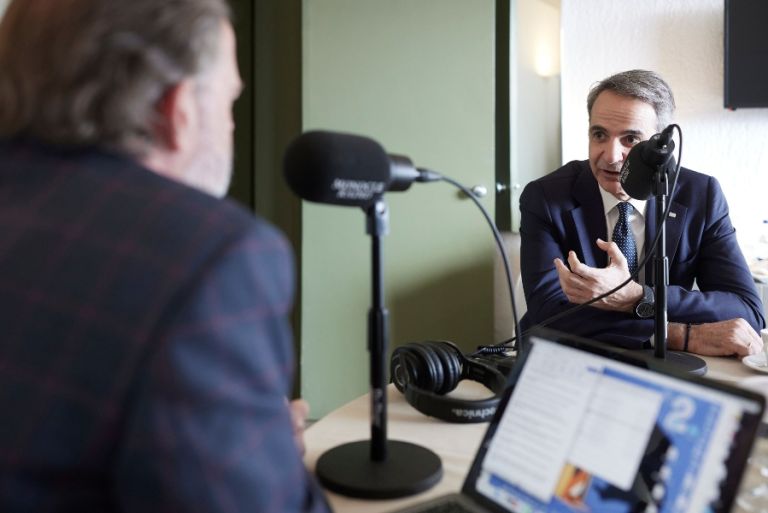
Πηγή Φωτογραφίας: ΓτΠ//Mitsotakis: We need bold decisions on defence and a Europe that does not take the US for granted
In a detailed and wide-ranging interview with Andrew Mueller for Monocle’s Foreign Desk, Prime Minister Kyriakos Mitsotakis spoke about international geopolitical developments, Greece’s relations with Turkey and the United States, and domestic challenges. Describing recent months as “complex and full of challenges,” he emphasized that these circumstances have served as a “rude awakening” for Europe, strengthening the case for the EU’s strategic autonomy.
Mr. Mitsotakis extensively discussed the need for a more united and bold Europe, with clear commitments and funding for defense issues. He reiterated his support for fiscal flexibility to cover defense expenditures and expressed satisfaction with the creation of a €150 billion funding instrument, noting that it is a step—albeit insufficient, in his view—in the right direction.
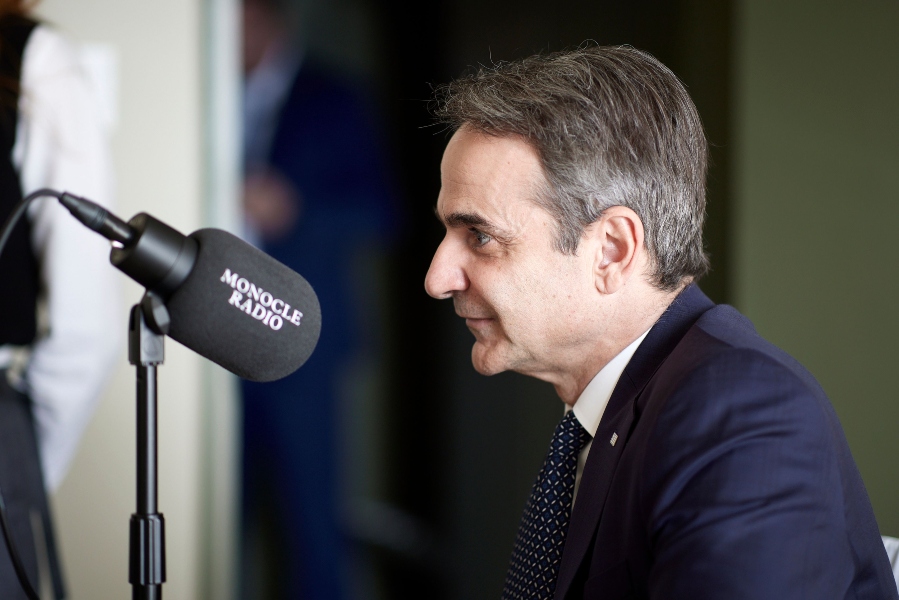
Regarding the relationship between Europe and the U.S., he pointed out that “for many years, Europe took security guarantees for granted,” but stressed that Greece was an exception, traditionally spending over 2% of its GDP on defense. While Europe cannot replace the U.S.’s role in NATO, it must do more to protect itself. He also referred to shifts in the transatlantic relationship in light of Donald Trump’s potential return to the U.S. presidency, saying, “We cannot take anything for granted.”
He placed special emphasis on Greece’s geostrategic position and its relationship with Turkey. He stated that the history between the two countries is “complex” and highlighted the importance of credible deterrent power, as well as the need to explore ways for a more productive relationship. Although he acknowledged that no progress has been made on the core issue of maritime zone delimitation, he stressed the importance of maintaining open channels of communication, even amid disagreements.
Asked about U.S. tariff threats against European countries and the potential breakdown of the international trade order, Mr. Mitsotakis expressed confidence that Europe and the U.S. would not drift apart. He underlined the importance of international trade rules and Greece’s role as a major maritime power, noting that “80% of global trade is conducted by sea” and that the country has a vital interest in ensuring the flow of goods. He was cautious about China, in contrast to his strong belief in the importance of transatlantic cooperation.
On the domestic front, he referred to the Tempi train tragedy and the general strike that took place during the Delphi Economic Forum. He recognized the accident as “a major collective trauma” and committed that justice would be served without interference. He criticized the opposition for exploiting the tragedy and emphasized that the government’s goal is to provide safe and reliable trains for citizens.
In closing, he reiterated his intention to run again in the 2027 elections, highlighting economic progress, reduced unemployment, and efforts to combat tax evasion. As he characteristically said, “There’s a lot of work to be done until 2027, and we’ll still have a lot of work to do after 2027—provided the Greek people trust us again.”
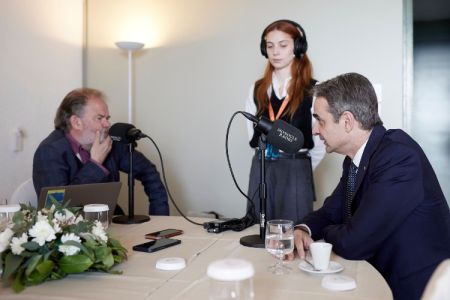
Full interview of the Prime Minister on Monocle Radio, on Andrew Mueller’s Foreign Desk:
Andrew Mueller: First of all—and there may not be a short answer to this—but is there any way you can describe what the last two months have been like, trying to be the Prime Minister of an EU and NATO country?
Kyriakos Mitsotakis: They’ve been complex and full of challenges. But in every crisis, I would say, I try to see the potential opportunities. Certainly, the last two months have, in a way, been a rude awakening for the European Union—especially for those of us who advocate for Europe’s strategic autonomy. I’m glad to see that at least there has been some progress in the decisions we’ve taken at the level of the European Council.
Andrew Mueller: Where do you see those opportunities though? In the idea of a more united, more coherent Europe?
Kyriakos Mitsotakis: At the end of the day, we have to realize that the strategic challenges we face require bold decisions. And when I talk about bold decisions, I obviously also mean funding—putting money on the table, especially when it comes to defense. For example, I have long supported greater fiscal flexibility at the national level in order to fund defense spending. When I first raised this issue, my colleagues were not ready to move in that direction. I’m pleased to see that there is now progress being made. We have a new financial instrument—loans amounting to €150 billion—which is not my preferred solution, but at least it’s a step in the right direction. For the first time, I see countries like Finland openly discussing exploring all avenues of financing for projects of common interest regarding European defense. In a way, this reminds me a bit of the months before we agreed on the NextGenerationEU plan, when many countries were opposed to the idea, only to agree at the last minute.
Andrew Mueller: But do you think that, particularly in the last two months—and maybe especially after U.S. Vice President JD Vance’s speech in Munich—Europe has moved beyond the point of taking the United States for granted? Is there now a sense among European countries that perhaps this relationship might not go back to how it was? That Donald Trump may not have been just a minor “glitch”?
Kyriakos Mitsotakis: I think it’s almost a cliché to point out that for many years Europe took security guarantees for granted—we simply didn’t spend as much as we should have on defense. Greece has been the exception to that rule due to our particular security concerns. We’ve always spent more than 2% of our GDP on defense. This argument was made by President Trump in 2017, so it’s not new. Europe is not in a position today to replace NATO and the dominant role of the U.S. in the Alliance when it comes to our collective security. So we undoubtedly need to work very hard to keep the United States engaged in this framework, while also recognizing that we must do more to protect ourselves. I believe we are moving in that direction—perhaps not as quickly as I would like, but there has definitely been progress.
Andrew Mueller: Regarding Greece’s particular situation—as you delicately put it—do you think Greece can teach something to Denmark or maybe Canada about how to manage difficult relationships with a NATO ally?
Kyriakos Mitsotakis: Our history with Turkey spans centuries. It’s a complex relationship. But I believe that, at the end of the day, two things must be ensured: first, Greece must maintain a very credible deterrent capability in defending our sovereignty and sovereign rights. That’s why we are investing significantly in modernizing our Armed Forces. At the same time, pathways toward building a more productive relationship must be explored—even if that means not addressing the core underlying issue at the heart of our difference with Turkey, which is the delimitation of maritime zones in the Aegean and the Eastern Mediterranean, where, frankly, we haven’t made significant progress. So, even if we agree to disagree on major issues, that doesn’t mean there always has to be tension, nor does it mean we can’t explore opportunities to strengthen our relationship on other fronts. And of course, that requires sincere and open communication channels, which I believe we have established with Turkey at all levels. I think it’s important that even when we disagree, we are able to speak openly.
Andrew Mueller: There’s been extensive discussion among EU and NATO heads of government about how to deal with the rather clear threats coming from the United States against the territory of two other Alliance members. Has there been any progress on that front?
Kyriakos Mitsotakis: Honestly, we haven’t yet reached a common position on how to deal with that challenge. From Greece’s perspective, for example, we have a strategic partnership with the United States. It’s a partnership that transcends any individual president. It’s a relationship I want to cultivate and strengthen. At the same time, I’m part of the European family and a committed European, so we also need to manage the relationship with the U.S. within a European framework. When we talk, for example, about tariffs and possible trade wars, I support the European Commission’s measured approach, which so far has been well-calibrated. I was pleased to see President Trump step back from his more aggressive tariff measures and give us three months to negotiate—which could lead to a mutually beneficial trade agreement.
Andrew Mueller: But that must be especially… I’m sure it’s frustrating for any European country involved in this, but for a major maritime nation like Greece, which controls—I believe—about one-fifth of global commercial shipping…
Kyriakos Mitsotakis: Almost one quarter.
Andrew Mueller: Almost a quarter, indeed. But you can’t plan long-term without knowing what the United States might do from one day to the next. So, does Europe—and indeed the rest of the world—need to start thinking about how to reshape a global trade order that doesn’t necessarily have the U.S. at its center?
Kyriakos Mitsotakis: I can’t imagine Europe and the U.S. drifting apart when it comes to trade. China is a more…
Andrew Mueller: You sound very confident saying that.
Kyriakos Mitsotakis: I am. But I wouldn’t be so confident if we were talking about China. At the end of the day, Europe relies on an open, rules-based international order—with free trade at its core. And of course, Greece is a small, open economy. As you said, we control about a quarter of the global merchant fleet. Eighty percent of global trade takes place at sea, via ships. So we have a special interest in ensuring that goods flow from country to country and from continent to continent, because our shipping industry provides that service. I basically believe that globalization has created such complex supply chains and interdependent interests that they will prove very hard to break. And I think markets also send a very clear message to the United States that very aggressive decisions and measures will have painful short-term consequences. At the end of the day, markets matter—certainly for a small country, we know a thing or two about that. But I believe they also matter for the world’s largest economy, which is the United States.
Andrew Mueller: But there’s a temptation—or might there be a temptation—for European countries, Greece in particular, perhaps because of its reliance on maritime trade, to think of itself as a potential exception to what Donald Trump thinks about Europe? I know every country in Europe thinks it has a special relationship, but you might think, “Maybe we’re the special ones,” because you know President Trump always speaks very favorably about Greece, and, it seems, about you—he did so just a few days ago. Do you ever get tempted to think…
Kyriakos Mitsotakis: Look, I’m not naive. We are not going to diverge from the majority of European countries when it comes to our relationship with the U.S. I’ll say it again—when we talk about trade, this is primarily a European competence, so we need to be united. But when it comes to security and defense, I believe national interests still play a very important role. For example, as I mentioned, we have signed a defense cooperation agreement with the United States, which is set to be renewed in 2026, and my goal is to renew it. I believe it’s a difficult challenge to maintain balance in these relationships, and we are trying to do so in the best possible way—depending on the issue at hand.
Andrew Mueller: I want to ask about some domestic issues, because we are speaking here at the Delphi Economic Forum, which has been affected by the fact that during its course, a general strike was held—largely related to the terrible train crash that happened two years ago. Are you surprised that a significant portion of Greeks sees it as symbolic of everything? This often happens with a specific event in a country’s life—we’re seeing something similar in Serbia right now—where people seem to believe that a horrific incident represents something bigger.
Kyriakos Mitsotakis: I don’t think there are real similarities between what’s happening in Serbia and what’s happening in Greece. Certainly, the train crash was a major collective trauma. I’ve been very clear that the justice system should be left completely free to investigate the matter thoroughly and ensure that those responsible face the consequences. Our responsibility is to make sure this never happens again, and that we provide safe and reliable trains for the Greek people. That’s what we’re working on. Unfortunately, when emotions run high, many theories tend to dominate public discourse. Sadly, I don’t think we know the full truth yet, but what I do know is that the opposition exploited this tragedy to harm the government. At the end of the day, that doesn’t serve justice, nor does it help the effort—especially of the relatives of those who lost their lives in this tragedy—who ultimately want the truth, they want justice, and they want to make sure this never happens again.
Andrew Mueller: Finally, I know you’ve recently stated that you intend to seek re-election in 2027 and that you hope to continue as Prime Minister. What unfinished business do you believe you still have? If you reflect on what you hoped you could do for Greece when you first took office, compared to how far you’ve come in that effort, what still remains?
Kyriakos Mitsotakis: So much. Look, this is a country undergoing a profound transformation. I believe we’ve received a lot of credit for our economic management. We’re no longer the “sick man” of Europe. Our economy is outperforming most European countries. When I look, for example, at the reforms the German government is currently announcing, I see that many of those reforms we’ve already implemented in Greece.
Andrew Mueller: You must take a certain pleasure in that irony.
Kyriakos Mitsotakis: I don’t see it as irony. I had, I believe, a very open conversation with the incoming Chancellor, Friedrich Merz, who has been very bold in his announcements.
But we know that there’s still ground to recover in order to converge with Europe. That remains our top priority and still requires significant, deep structural reforms.
Take tax evasion, for example. Everyone used to think it was endemic in Greece. Every government in the past pledged to tackle it. None succeeded. We did—and that gives us great fiscal firepower. When I talk about returning the collective wealth we’re creating to the people, that’s exactly what I mean. We need more jobs. We’ve reduced unemployment from 17% to 8%. We want to bring it down quickly to the EU average.
I want higher wages and lower taxes. To achieve that, you need a healthy and strong fiscal position. Greece is consistently producing substantial primary surpluses. Our borrowing costs have dropped significantly. These are the foundations on which we must build all our policies. Rest assured, there’s a lot of work to do between now and 2027—and there will still be a lot of work to do after 2027, if the Greek people decide to place their trust in us once again.
Source: pagenews.gr
Διαβάστε όλες τις τελευταίες Ειδήσεις από την Ελλάδα και τον Κόσμο










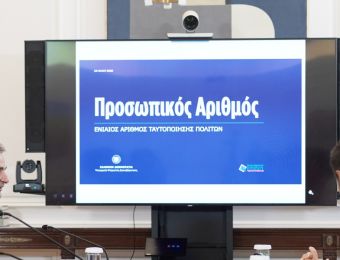



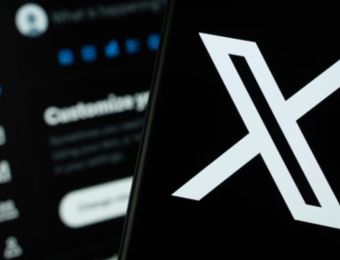
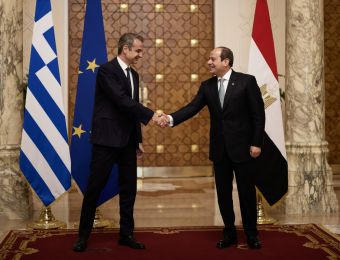
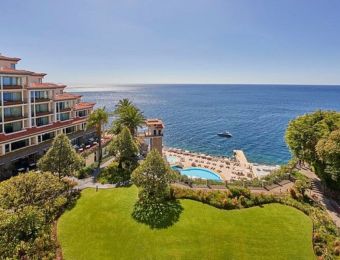


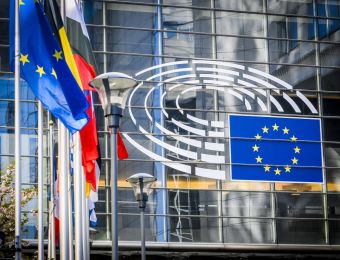
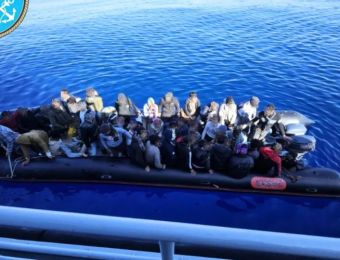
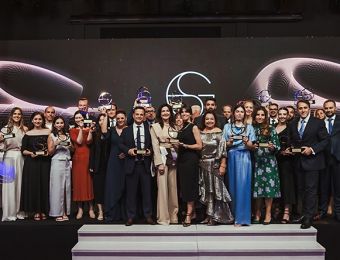
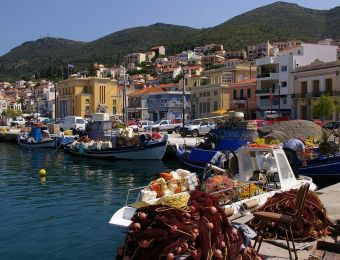
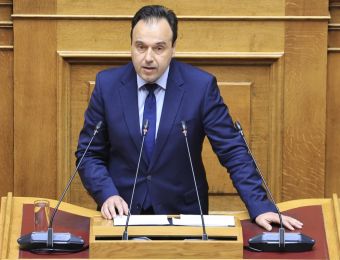
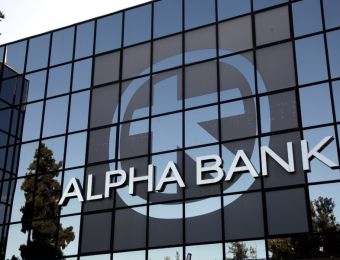
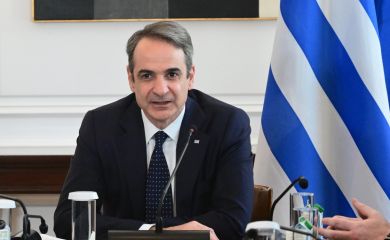


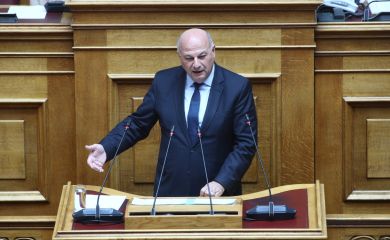
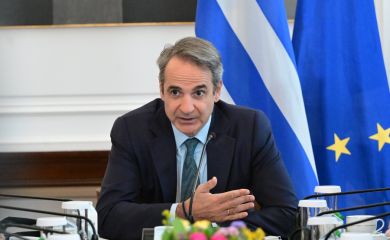
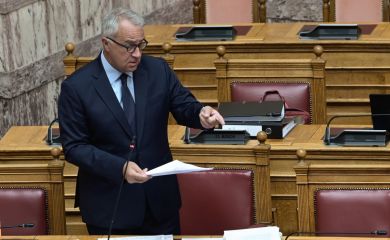
Το σχόλιο σας